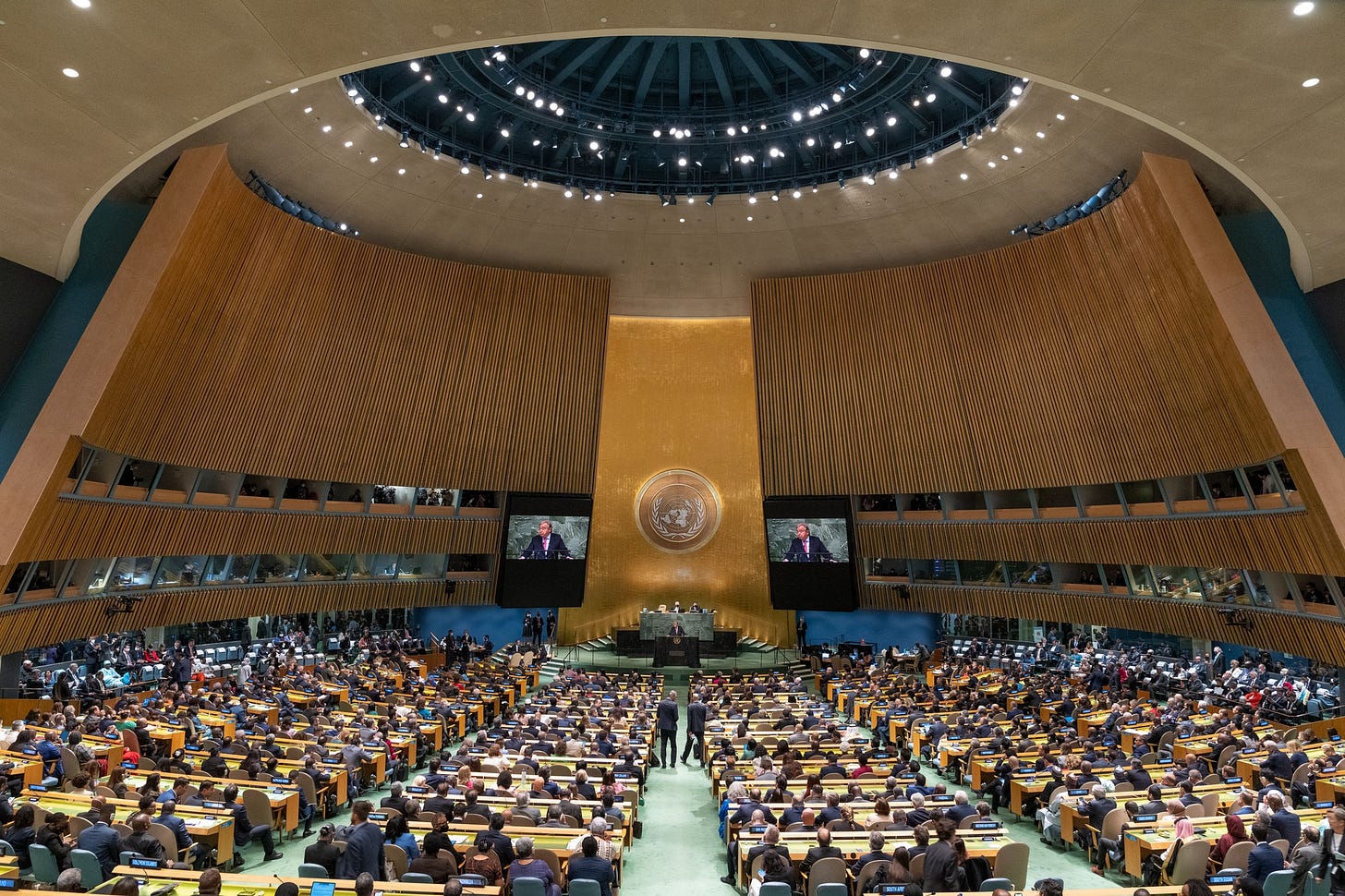World leaders get vocal at the UN, catastrophic flooding in Pakistan and downsizing an entertainment behemoth
September 2022
Farewell summer, hello autumn!👋
The changing of the seasons brought an avalanche of news stories and geopolitical developments. Recapping the top headlines alone would fill half the newsletter.
So in order to keep the conversation focused, this edition covers the sombre mood at the UN General Assembly, Pakistan’s “biblical” floods and the reshaping of an American media giant.
ON A SOAPBOX
Government chiefs rounded out the month in New York for the 77th session of the UN General Assembly. The annual gathering of national leaders returned to its first in-person instalment since 2019, and the speeches were considerably fiery to mark the occasion.
In his opening remarks, the UN Secretary General gave a bleak assessment of international relations and the state of the planet. “We cannot go on like this,” said António Guterres. “We have a duty to act. And yet we are gridlocked in colossal global dysfunction.”
In theory, the General Assembly is meant to be the ultimate parliament where peaceful solutions are discussed. But the reality is the weeklong debate has morphed into a platform to attack enemies and promote agendas.
This year, though, the overwhelming sense of doom and gloom saw leaders unite on key issues:
War in Ukraine - Unsurprisingly, Russia’s military incursion dominated the speeches. Joe Biden and his European allies vehemently denounced Vladimir Putin’s actions. “This is imperialism, plain and simple,” declared German Chancellor Olaf Scholz. Russian foreign minister Sergey Lavrov slammed the West for Russophobia.
Democratic ideals - The topic of Ukraine sparked passionate pleas to protect democratic systems against old and emerging threats. “Our democracies are slowly being poisoned by lies and fake news,” noted Israel’s prime minister.
Sustainable development - “The alarm bells of climate change are growing louder,” Australia’s foreign minister told the hall. It was a sentiment echoed by multiple speakers.
Multilateralism - Countries of the so-called Global South, including Barbados, Kenya and India, criticised the supremacy of the UN Security Council and G7. They stressed the need for fairness and equity to reflect the multipolar world.
DESTRUCTIVE FLOODING
Massive flooding has plunged a third of Pakistan underwater. The scale of human suffering is immense, with 33 million people impacted by the crisis. Pakistani officials warn that it could take months for the waters to recede.
Although monsoons are a regular annual occurrence, this year’s storms began earlier than normal and the intensity of the downpour was fierce. Furthermore, the monsoon fell in the south of the country where much of the land is arid and flat, causing rainwater to accumulate at dangerous levels.
This extreme weather event coincides with climate change concerns and domestic troubles in Pakistan. According to scientists, global warming is likely to have amplified the deluge. They also point to heightened risks from melting glaciers in the north of the country.
Pakistani government ministers claim their nation is a victim of the carbon footprint of the developed world, and want the West to step up donations. They estimate it will cost billions of dollars to rebuild homes and villages, repair infrastructure, and support farmers who have lost crops and cattle.
The problem is Pakistan was already negotiating an IMF bailout as well as securing investment deals from Saudi Arabia, Qatar and others to help bolster its diminishing foreign currency reserves. Plus, decades of economic mismanagement and resistance towards reform have triggered donor fatigue with Pakistan’s ruling elite and military.
Case in point: Many in the international community are frustrated that previous aid programmes failed to result in proper environmental controls and mitigation measures, even after 2010’s devastating floods.
An additional block is Pakistan’s political instability. Imran Khan, who was ousted from office in April, continues to hold rallies and press for elections as Shahbaz Sharif’s new administration fights to find its footing.
One former Pakistani ambassador wrote in an op-ed: “Divisive politics during the ongoing climate calamity, which has also involved some parties stoking controversy over flood donations, has denuded the country of a coordinated and unified response.”
IT’S SHOW-BUSINESS!
HBO collected lots of shiny hardware for its trophy cabinet at the Emmy Awards on 12 September. The American broadcaster took top honours for Succession, The White Lotus, Euphoria, Hacks and Last Week Tonight, once again demonstrating its prowess for producing prestige TV shows.
However, the future of HBO - along with its siblings in the WarnerMedia family - is looking uncertain following the recent merger with Discovery. The conglomerate, now called Warner Bros. Discovery, boasts an extensive portfolio of entertainment and news brands, including CNN, Cartoon Network, DC Films, Discovery Channel, Animal Planet and Eurosport. But while those assets sound impressive, managing them is extremely costly.
WBD’s stock has tanked because investors are unhappy with its enormous US$50+ billion debt burden. Enter CEO David Zaslav: the man responsible for improving the company’s balance sheet. As the boss of Discovery, he gained a reputation for focusing on accounting rather than quality content. Hence, the proliferation of low-budget reality series at the expense of factual programming.
Creatives in Hollywood and New York were worried about chief’s sharp axe when the WBD deal was announced - and it seems some of their fears were valid. In the last few months, Zaslav has pulled the plug on CNN+, shelved the Batgirl movie, cancelled TV shows and slashed jobs. Industry reports paint Zaslav as a villain who alienates filmmakers and actors, such as Clint Eastwood.
Of course, that narrative is simplistic. Showbiz is a tricky business comprising of dozens of stakeholders, from cinema chains to scriptwriters to audience members. Is there anything wrong with halting vanity projects, or stopping streaming services from bleeding cash? Zaslav and his C-suite would argue no.
Nevertheless, WBD is a media behemoth (second only in size to Disney), so it’s a major trendsetter. Watch this space for more.
Thanks for reading! Take care and stay curious, Sara x






